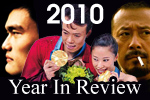From Chinese Media
Poll says govt feasts drive up liquor price
Updated: 2011-02-22 14:44
By Yan Weijue (chinadaily.com.cn)
A survey by China Youth Daily found that most people (92.9 percent of all respondents) believe the price increase in upscale baijiu, or Chinese liquor, is closely linked to the misuse of public funds for government banquets.
Of the 5,680 respondents, 58 percent expressed their interest in news concerning the price surge, with 23.9 percent showing "great attention" to it.
Wuliangye said it raised the price to "better fit the status of its customers," while Moutai explained the move as "an overall arrangement of interests of the country, customers, enterprises, distributers and investors."
But clearly the public is not buying it. Of those surveyed, 84.3 percent attribute the price increase to excessive consumption by public authorities who do not care about price. Other reasons cited include vast business feasts (54.2%), the social trend of keeping up with each other (52.3%) and price-fixing by producers and distributers.
"Market factors play a secondary role in this case," says Long Taijiang, a professor at Hunan University. "They raised the price because recreational activities using public funds are not sensitive to price changes."
"More noticeably, if you don't elevate the price of your brand as others do, you will find yourself in an awkward position where the buyers turn you down because you are not upscale enough," he added.
Banquet spending at state expense has become increasingly excessive in China, as it meets bureaucratic freeloaders' demand for displaying their power. The upscale Chinese liquor therefore has now become a prominent token on dining tables. In the first half of 2007, the Xinyang city government in Henan province saved 43 million yuan by just banning public employees from drinking at lunch hour. In Shanwei city of Guangdong province, the banquet expenses of a tobacco bureau swallowed up more than 12 million yuan in 2010.
Long believes the situation is the result of three factors. First, the lack of an effective outside supervision mechanism, as the current one is from the government body itself. Second is the insufficient transparency in public funds spending. The last goes to the vagueness of budget planning, which leaves room for misappropriation of funds.
"The main goal of curbing public spending in wine and dine extravagance is to restrain the abuse of power through public supervision," he said.
Specials

Spring Festival
The Spring Festival is the most important traditional festival for family reunions.

Top 10
A summary of the major events both inside and outside China.

A role model
Alimjan Halik had been selected as the "Cyberspace Personality Who Moved the Hearts of the Chinese in 2010".



